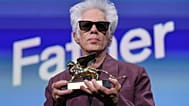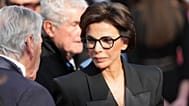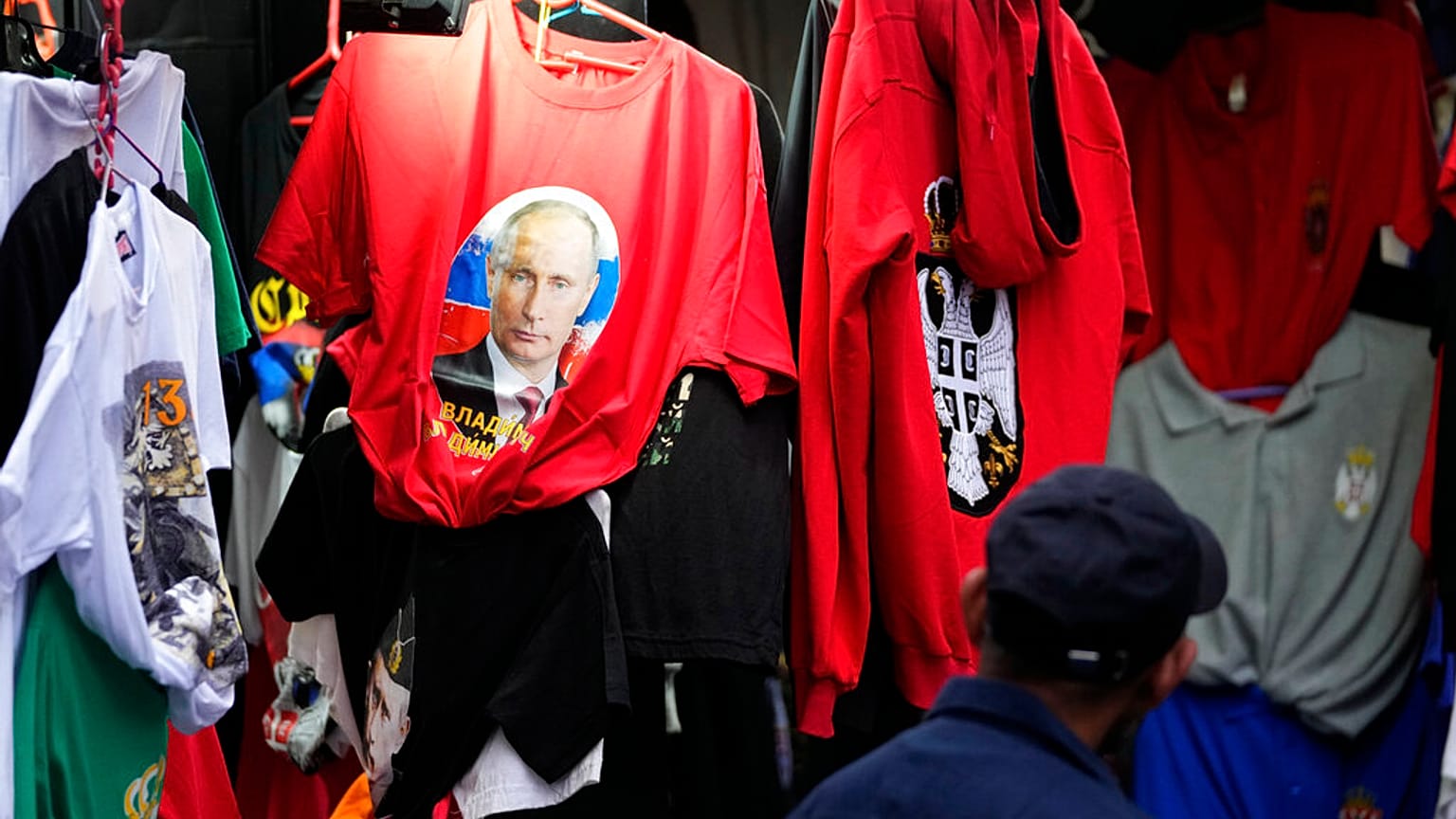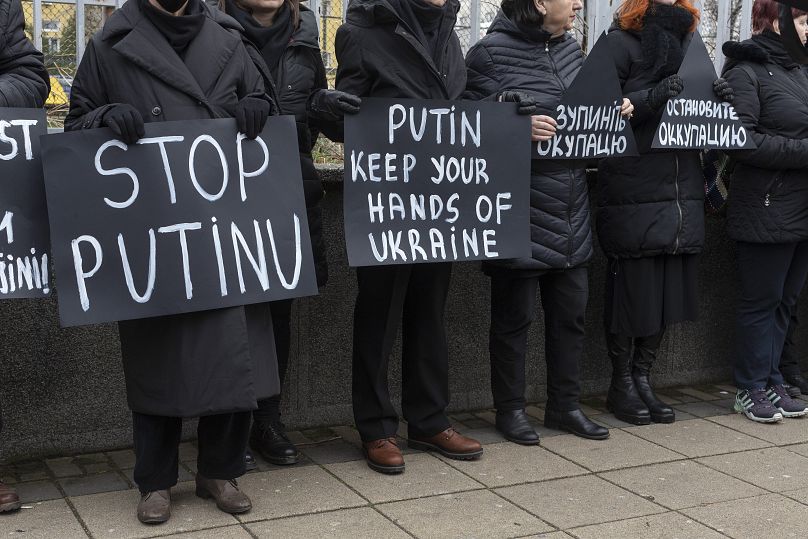Stuck between horror at the bloodshed and loyalty to its friend, Russia, Serbia has walked a delicate line.
 ADVERTISEMENT
ADVERTISEMENT
Russia’s war in Ukraine leaves Serbia stuck between a rock and a hard place
Serbs have opened their doors to the Ukrainian brethren and condemned the violence in Ukraine, but painful memories of 1999 have made them wary of supporting sanctions.
The sound of air raid sirens in Kyiv and other Ukrainian cities sent shivers down the spines of Serbs old enough to remember the same ominous sound they heard so many times for 78 days in 1999 when NATO planes bombed cities of what was then still Yugoslavia to end Slobodan Milosevic's military campaign in Kosovo.
“Poor, poor people,” is the most frequent comment on the war in Ukraine you will hear from ordinary people in Serbia. Serbs insist that their expressions of sympathy are heart-felt exactly because people in Serbia know from their experience how Ukrainians feel right now in the bomb shelters.
There are relatively few Ukrainian refugees in Serbia. But those who sought refuge with their friends and relatives have felt this solidarity. Among them is Olga Hordyenko.
After a two-day journey, she arrived with her three small daughters at the flat of her younger sister who has been living in the Belgrade neighbourhood of Banjica for twelve years. Her sister, Kateryna Zoraya posted the story of their ordeal on the Viber group of the neighbourhood and was overwhelmed with the response.
“Our neighbours have a very big heart. They organised themselves and offered everything to us. The people are ringing the bell all the time, offering food, clothes for the children, they cook for us, they even offer accommodation in case we are overcrowded,” said Kateryna.
“They come to hug us and talk to us. I couldn’t cope without them.”
But beyond the human reaction, the stance of Serbian society to the war is reserved at best. It is far from the unequivocal condemnation of the Russian invasion that you find elsewhere in Europe.
“War and despotism are the main enemies of freedom and, in that respect, the people in Serbia have no dilemma whatsoever. And they would not like to live in the authoritarian regime of Putin’s Russia," said Zoran Stojiljkovic, professor of political science at the Belgrade University.
"There are two reasons for the quiet condemnation of the aggression and staying shy of the sanctions. One is the memory of the sanctions and bombardment by NATO in 1999 which had neither legal basis nor legitimacy. It produces a kind of understanding for the Russian fear of NATO’s eastward expansion and their insistence on the neutral status for Ukraine.
"The other reason is the energy dependence on Russia and the conviction that Russia is the guarantor of our interests in the Kosovo issue and the balance of forces in the region.”
Since the beginning of the war in Ukraine, Serbian media were as divided in their attitude as ever.
Tabloids appealing to the popular sentiment were cautiously jubilant, quoting mainly Russian sources and showing the scenes of the Russian military might while the more Western-orientated or Western-owned media joined the condemnation of the invasion.
“The Serbian society is deeply divided on all the issues, including the Ukrainian war,“ says Jaksa Scekic, a retired veteran correspondent of Sky News and Reuters from Belgrade.
“Since there are more people who support Putin, the media tries to appeal to public sentiment and pours oil into fire and pumps up the pro-Putin hysteria.
“But you do have the media that tell you otherwise and support the other side. In other words, the media landscape is the reflection of the political differences in Serbia and these differences will grow. The media will be the first victim of this divide.”
Indeed, whether the future of the country lies in the east or in the west is the main point of division in the Serbian nation, created centuries ago, during and immediately after the wars of liberation from the Ottoman empire.
But in the last two decades, Serbs have not voted for parties that oppose the country’s EU integration, and the joke is that while Serbs’ hearts may be in Russia, their pockets are in the West.
And with a good reason. More than 61% of the Serbian trade is with the EU member states, Germany and Italy being the biggest trade partners.
But Russia supports Serbia in its political struggle to prevent what Belgrade considers to be its breakaway province of Kosovo from becoming a member of the United Nations. Kosovo, which is recognised as an independent state by 100 nations, has repeatedly had its UN bid vetoed by Russia.
Even economy-wise, Russia is among the four biggest trade partners for Serbia and has a free trade agreement with Belgrade. Serbia never joined EU sanctions against Russia and has benefitted from this decision as the export to Russia grew to around a billion dollars.
The first reaction of the government to the war in Ukraine and anticipation of tougher demands to take a side was that Serbia is between Scylla and Charybdis - but that it should try to follow just its own interests.
“We are not interested in the East or the West, we are only interested in Serbia. We have no problem with saying that we support the territorial integrity of Ukraine, but we ask what happens with the territorial integrity of Serbia that was so brutally crushed with the recognition of the independence of Kosovo,” said the outgoing speaker of the Serbian parliament, Ivica Dacic.
“Revoke the recognition of Kosovo first, and then you can pressure Serbia,” Dacic said.
Serbia has maintained the same foreign policy course since the democratic revolution of 2000: work towards membership in the EU, but don’t sacrifice close ties to China and Russia.
Developments in recent years contributed to the sense of prudence of such a policy. Serbia has been a candidate for EU membership since 2012. French President Emmanuel Macron brought a sobering message to Belgrade in July 2019: Serbia is on the path of European integration but the enlargement process is put on hold until all the internal problems in the EU are resolved - meaning indefinitely.
This meant that the promise of the European future of Serbia, and the Western Balkans, given at the EU summit in Thessaloniki 17 years ago, was to be broken.
It coincided with the ever-larger influx of Chinese finances for the infrastructure that is part of the Belt and Road Initiative and investment in major projects, including a steel mill and a copper mine.
When the Covid pandemic broke out at the beginning of 2020, virtually a day after the EU cut the export of its medical supplies and left the candidate countries to fend for themselves, a Chinese plane with respirators and protective gear landed at Belgrade airport. It was just the first of many.
Part of the cargo was a donation, including a whole laboratory for testing and analysis, which prompted a pro-government newspaper to rent billboards in Belgrade with the message: “Thank you Brother Xi“. As soon as the Chinese and Russian vaccines were ready they were dispatched to Serbia and it became the country with the earliest and most advanced vaccination in Europe, with jabs available even to foreign nationals and donated to neighbouring countries.
To ordinary Serbs, it was reminiscent of the times of communist Yugoslavia when the country benefitted from President Tito's decision to form the Non-Alignment Movement and present itself as a bridge between the two blocks deadlocked in the cold war.
The fall of the Soviet Union brought joy for most in Europe but for Yugoslavia, it meant the beginning of bloody disintegration. Serbia ended up confronted with the sole remaining power, a confrontation that cost the people of Serbia dearly.
“Serbs remember America’s “unipolar moment“ as the time when all their national interests were crushed. Serbia was not sorry to see it go, and would hate for it to return,” said Ljiljana Smajlovic, a journalist.
“It meant everyone was allowed to secede from the Serbs, while the Serbs were not allowed to secede from anyone. NATO carved up Serbia’s sovereign territory to give Kosovo Albanians an independent state. Precisely what Putin is doing in Ukraine,” she said.
“Can you blame the Serbs for doubting a sole power’s credibility as a defender of international law and order?”
But striking a balance between east and west is becoming more and more difficult for Belgrade.
In an extraordinary address to the nation on Wednesday, President Aleksandar Vucic said that the world “showed no understanding for our position.”
“I expect several political traps for Serbia in the period ahead,” he said.
“You saw that some people in the region do whatever they can to make Serbia fall down. You saw that the Albanians (in Kosovo) are now demanding to become a NATO member and that they have the support of Turkey. I can foresee that one of the next initiatives will be to expel Russia from the United Nations. I already see such demands in certain countries.”
He reacted to editorials in the Croatian media, that speculated about how long Serbia would be able to “sit on two chairs”.
“We are sitting on our own chair and the pressure is very high on our country. It will be hard to withstand that pressure, there are many open questions,” he said.
Analysts believe that due to the events from the recent past the policy of neutrality was not only desirable - but the only possible one.
“Having in mind our total energetic dependence on Russia I think that no country [...] would have acted differently in our position. I think that if they want to assess the situation objectively and act responsibly, they should accept the current stance of Serbia for the time being,’ said Professor Ivo Viskovic, retired Serbian diplomat and ambassador to Germany.
Others believe that having missed the opportunity to join the wave of the EU enlargement frenzy in the 90s and early 2000s, the country was drawn into an unavoidable and unenviable situation.
“Russia is far away and the EU and NATO surround us from all sides. Remember that old African saying that when the elephants fight the grass gets trampled? Well, sadly, we are the grass,“ said Professor Ljubodrag Savic from the Economy School of Belgrade University.
On 25 February , the National Security Council of Serbia said that Serbia abides by the principles of international law and therefore was “extending full and principled support to the principle of territorial integrity of Ukraine.” It considers “the breach of the territorial integrity of any country, including Ukraine, to be very wrong.”
But when it comes to sanctions against Russia, the document says that the country will act only according to its own vital and economic interests.
“As a country which has experienced the sanctions of the West and whose kin in Republika Srpska is under sanctions now, the Republic of Serbia believes that it is not in its vital economic interest to introduce sanctions on any country, including its representatives or economic subjects,” it said.
Along the same lines, Belgrade envoy to the UN joined the UN General Assembly resolution on the war in Ukraine condemning the Russian attack but only because it does not mention any sanctions. The vote was followed by positive reactions from the EU diplomats in Belgrade.
In addition to all the aforementioned reasons, the war in Ukraine caught Serbia in the middle of the electoral campaign. Parliamentary, presidential and Belgrade municipal elections are scheduled for 3 April. With the sentiment for Russia still strong among the electorate, no party or candidate wants to gamble with the radical changes of the well established foreign policy.
But the elections will pass and the pressure is likely to grow.
“Small countries -- and all our countries in this region are small -- [should] try not to be drawn into this conflict, or at least not too involved in the collision,” said Dejan Jovic, professor at the Faculty of Political Science at the University of Zagreb, Croatia.
“I think they should stick to their principles, to condemn aggression, to condemn war, to cheer for peace, to offer terms, including negotiating and goodwill services and try to act in a way that will not deepen the rifts both internal or between those countries.”
_Bojan Brkic is news director at Euronews Serbia _














